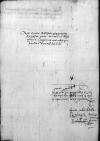List #695
Ferdinand I of Habsburg do Ioannes DANTISCUSSpeyer, 1531-10-09
Rękopiśmienne podstawy źródłowe:
Pomocnicze podstawy źródłowe:
Publikacje:
| ||||||||||||||||||||||||||
Tekst + aparat krytyczny + komentarzZwykły tekstTekst + komentarzTekst + aparat krytyczny
 BNW, BOZ, 2053, TG 13, No. 1517, f. 72v
BNW, BOZ, 2053, TG 13, No. 1517, f. 72v
Reverendo devoto sincere nobis dilecto domino
 BNW, BOZ, 2053, TG 13, No. 1517, f. 72r
BNW, BOZ, 2053, TG 13, No. 1517, f. 72r
Reverende devote sincere dilecte.
Redditae sunt nobis litterae vestrae una cum adiunctis serenissimimi principis domini
Datum in nostra imperiali civitate
Ioannes Maius scripsit(?)

